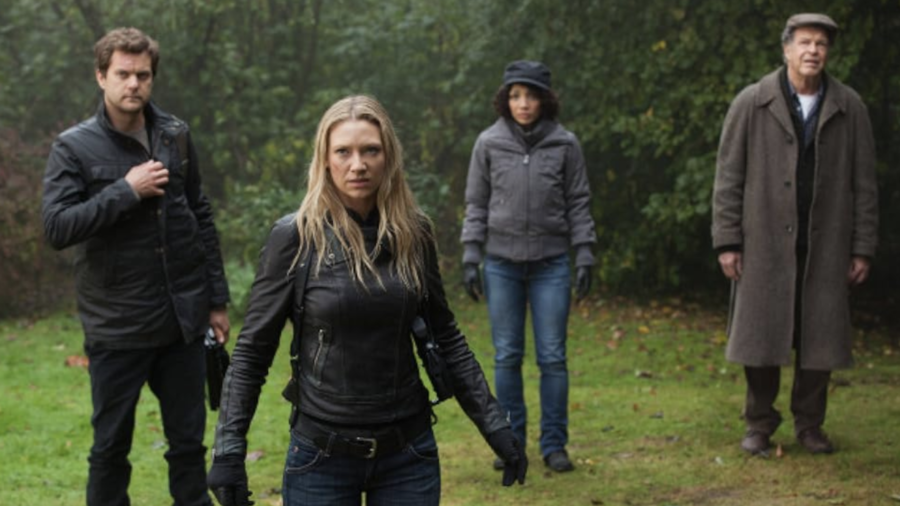Fringe Post Game: Black Blotter

You always knew that Walter (John Noble) had the best drugs, and with an episode called “Black Blotter,” you can rest assured that this week’s Fringe is going to be something to behold.
His pharmaceutical and chemistry skills are on full display, and if you’ve always wondered what Walter’s many trips—which have become the stuff of legend—are like, you’re about to find out in what may be my favorite episode in what has already been a strong finale season.
I can’t think of anything clever to say, so just know that there are many Fringe spoilers beyond this point.
Now that Peter (Joshua Jackson) has removed the Observer tech from the base of his brain, and is no longer out for at-all-costs revenge against the people responsible for his daughter’s death, the primary narrative focus has shifted to Walter.
Specifically, his internal battle to remain the man he is and not revert to his previous state, where he was proud, greedy, and viewed himself as a god among men. If the Fringe team has a chance to defeat the invaders, this is going to be a key to their success. Plus, Walter has always been the heart and soul of the show, and if he’s unable to save himself, what hope is there for humanity?
Fringe‘s “Black Blotter” does a number of important things, chief among them is bringing in the idea of intersecting timelines. Sam Weiss (Kevin Corrigan) reappears, sort of, if you can call discovering his desiccated corpse “appearing.” The miniature Observer, now known as Michael, also pops up, but when they couldn’t find him in the pocket universe a few episodes ago, you knew they’d find him eventually. The closer we get to the end, the more everything is coming together.
Still, as vital as all the surface Fringe events are to the overall plan, the architect of that plan is embroiled in a different battle. The good and evil sides of his mind—represented by Nina Sharp (Blair Brown) and Walter’s dead lab assistant—vie for dominance, aided, of course, by a massive dose of hallucinogens.
This back—and—forth pull—one wants Walter to stay on the path, to remain the good, kind man he has become, while the other wants him to join the Observers, where, with his massive intellect, he would be treated like a king—raises the question of which Walter is the real Walter. We think we know, but do we?
The lab assistant brings up an interesting Fringe argument. Walter was Evil Walter for much longer than he has been Good Walter, and in order to become Good Walter, they had to remove pieces of his brain, pieces that have since been reinserted.
As much as I love Walter and don’t want to see him become an enormous douchebag, she makes a valid point. Fate has always played a big role in Fringe, and maybe Walter is destined to be a villain. He has, after all, been a destructive force in the past, almost ripping multiple universes apart at the seams.
Is that who he is supposed to be, and everything else has been a path to get him back to his true self? Or is it a converse argument that he is destined to be the kind, caring Walter, and all of his terrible deeds make his destination that much more remarkable? Now that this topic is on the table, it will be interesting to see how they resolve the situation in the four remaining episodes of season five.
Fringe‘s “Black Blotter” also provides a unique look at the women in Walter’s life. Let’s be honest, he ha a checkered, and questionable history as far as relationships are concerned. His drive and brilliance are attractive qualities, but also makes him an incredibly difficult individual to be around on a consistent basis.
Coming down, Walter has one of those dark moments of serious introspection as his most significant relationships—his wife, his assistant, Nina Sharp—play out in front of him like a grainy old movie. What he sees isn’t easy to watch, and you can see how despondent he becomes.
Still, there is hope for Walter on Fringe. Besides giving you a glimpse into the magical world of a Walter Bishop Acid Trip—think neon fairies, psychedelic rock, pill-delivering butlers, an emerald castle, and a Monty Python cartoon—the LSD is a delivery mechanism for important choices.
His hallucinations continually place him at a crossroads, like when he arrives outside of the Observers NYC headquarters. At this moment, he can either turn around and go back to Boston and his people or betray them out of a lust for power.
Here is why Good Walter still has a chance. The final Fringe choice, when he has to decide whether or not to burn his big book of secrets, he throws the match. Granted, the book isn’t real, and it represents hidden knowledge that he has now unlocked and that is floating around inside his head.
That might very well prove problematic moving forward. However, the most important piece is that when given the choice, when confronted with his two possible paths, he chooses the man he has become, not the man he was. And that gives me hope.
Fringe‘s “Black Blotter” is a powerful episode for a variety of reasons. There is Walter’s struggle, some tender moments of healing between Peter and Olivia, and an encounter with the couple that has dedicated their entire lives to the resistance. A fast-paced shootout moves things forward, and the writes plays a bunch of neat narrative tricks, just to keep you on your toes. The end result is a particularly strong episode in an excellent send-off season.










